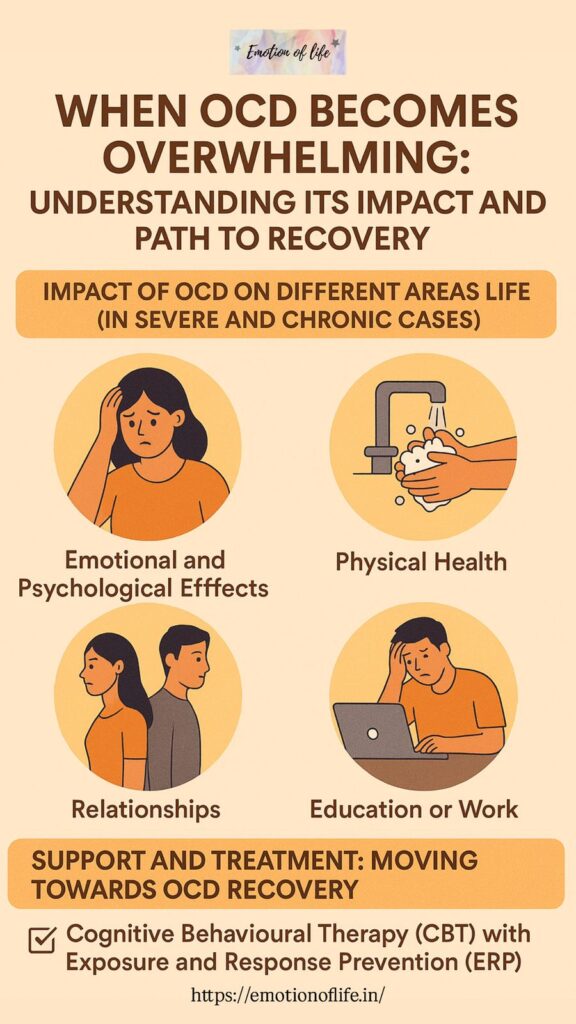
Impact of OCD different area of life (in Severe and Chronic cases)
When OCD Becomes Overwhelming: Understanding Its Impact and Path to Recovery
Introduction : Looking at OCD from the Inside
Impact of OCD in Different Area of Life, Obsessive-Compulsive Disorder (OCD) isn’t just a clinical term it’s a real-life struggle that can feel all-consuming. For people living with severe or long-term OCD, each day can feel like a constant tug-of-war between distressing thoughts and the need to find relief. These thoughts can be disturbing and persistent, while the actions that follow known as compulsions are often performed not out of desire, but out of desperation to reduce intense anxiety.
Impact of OCD in Different Area of Life: At Emotion of Life, we believe recovery is not only possible within its reach. But also to move forward, to understand the Impact of OCD in Different Area of Life, it’s important to understand how OCD touches every corner of a person’s life, especially when the condition becomes chronic and deeply ingrained. This article takes a closer look at that experience and how care, connection, and the right support can guide someone back to themselves.
Living with OCD: A Mind that Doesn’t Rest
When someone is dealing with OCD, especially in its more severe form, Impact of OCD in different areas of Life is not limited to thoughts only person with OCD mind becomes overwhelmed with recurring thoughts that are often frightening or irrational. These could include fears of contamination, fears of harming others unintentionally, or anxieties about making a mistake. In response to these thoughts, the person may feel compelled to perform actions like excessive cleaning, checking, repeating certain behaviours, or mentally reviewing things to gain a sense of control.
Impact of OCD on Emotional and Psychological Effects
- Feeling anxious almost all the time
- Guilt or shame over thoughts they can’t control
- Difficulty focusing, relaxing, or making decisions
- Feeling emotionally drained or hopeless
Impact of OCD on Physical Effects
- Trouble sleeping due to nonstop thinking
- Tiredness from repeating rituals or routines
- Body tension, aches, or other stress-related symptoms
OCD doesn’t always look the same. Here are a few ways it can appear in someone’s life:
- Fear of Contamination: Worry about germs, dirt, or illness, leading to frequent cleaning or avoiding people and objects.
- Checking Behaviours: Repeatedly checking things like locks, switches, or appliances to prevent imagined dangers.
- Need for Order or Perfection: Wanting everything to be symmetrical or placed exactly right to avoid discomfort or bad outcomes.
- Fear of Harming Others: Intense fear of accidentally causing harm even if there’s no intention to do so.
- Intrusive Thoughts (Pure O): Distressing thoughts around topics like morality, identity, or harm, often without visible compulsions.
Why OCD Becomes Severe or Long-Term
OCD often doesn’t have one clear cause. In many cases, it’s the result of a mix of emotional stress, life experiences, and how a person processes thoughts and feelings. It’s important to remember that OCD is not a personal weakness or flaw, it’s something that can be managed and treated.
Emotional and Mental Contributors
- Past trauma or emotional neglect
- Having a very rigid or perfectionistic mindset
- Strong sensitivity to anxiety or uncertainty Social and Relational Factors
- Growing up in a critical or emotionally disconnected home
- Pressure to always perform well or “be perfect”
- Not feeling understood or accepted by others
Environmental Triggers
- Major life changes (loss, illness, relationship issues)
- In rare cases, certain childhood infections
- Any situation that causes overwhelming stress
How Chronic OCD Affects Everyday Life
When OCD becomes deeply rooted, it can interfere with many areas of a person’s life. Here’s how that can look:
1. Relationships
- Fear of being judged or misunderstood can create emotional distance
- Repeated behaviours might cause tension with family or partners
- It can become difficult to stay emotionally connected to others
2. Education or Work
- Trouble focusing or completing tasks due to constant mental distractions
- Fear of making errors or being held responsible for negative outcomes
- Missing out on school or job opportunities due to symptoms
3. Physical Health
- Over-washing can lead to skin problems
- Poor sleep and irregular eating due to intrusive thoughts
- Chronic fatigue from mental and emotional stress
4. Daily Life and Independence
- Avoiding social situations, travel, or public spaces
- Taking hours to complete daily routines
- Feeling unsure of oneself or dependent on other
Support and Treatment: Moving Towards OCD Recovery
At Emotion of Life, we’ve seen that every person’s path through OCD is different, but everyone has the capacity to recover. Recovery is all about rationalizing your old maladaptive thoughts with logical thinking and adapting accommodating your thought pattern in a socially adaptive way, while learning how to respond to them in new, healthier ways.
Therapeutic Approaches
- Cognitive Behavioural Therapy (CBT) with Exposure and Response Prevention (ERP) is one of the most effective ways to treat OCD. It involves facing fears in small steps, while learning to reduce rituals and rely less on compulsions.
- Acceptance and Commitment Therapy (ACT) helps people focus on their values and learn how to live with their thoughts rather than fighting them.
Real Story: Aarav’s Journey Through OCD
Aarav, a 30-year-old man, struggled with severe OCD for over a decade. Every day, he spent hours making sure everything in his house was perfectly safe: doors locked, switches off, gas closed. This constant checking caused him to lose his job and drift away from relationships.
When Aarav joined the Emotion of Life OCD Recovery Program, he started working with a therapist on ERP. Over time, he learned to challenge his fears and sit with discomfort. Nine months later, he returned to part-time work and built a new, healthy relationship with someone who understands his struggles and growth.
Today, Aarav still practices his recovery strategies, but OCD no longer runs his life. He now feels more connected, capable, and hopeful.
Suggestions for Those Facing OCD
- Begin Now: Don’t wait for things to feel “bad enough.” Seeking help early can make a big difference.
- Celebrate Small Wins: Delaying a compulsion or facing a fear no matter how small a big achievement is.
- Reach Out: Let people in. Talking about OCD can break isolation and create new support.
- Learn and Educate: Understanding your condition can reduce shame and increase self-acceptance.
- Be Kind to Yourself: Healing doesn’t happen overnight. Every step forward matters, even the slow ones.
Conclusion: Impact of OCD on Different area of life
Chronic OCD can feel like it’s taken over your world, leaving you stuck in routines and fears. But things can change. With the right guidance, therapy, and care, life can open up again. You are not your OCD, and you are never alone in your journey.
At Emotion of Life, we walk beside you through every challenge. Recovery isn’t about becoming someone else, it’s about returning to who you truly are, underneath the fear, with strength, courage, and self-compassion.







